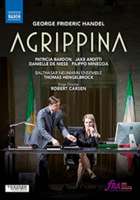|
Back
01/20/2019
George Frideric Handel: Agrippina, HWV 6
Patricia Bardon (Agrippina), Danielle de Niese (Poppea), Jake Arditti (Nerone), Filippo Mineccia (Ottone), Mika Kares (Claudio), Damien Pass (Paliante), Tom Verney (Narciso), Christoph Seidl (Lesbo), Balthasar Neumann Ensemble, Thomas Hengelbrock (conductor), Robert Carsen (stage director, lighting co-designer), Gideon Davey (set and costume designer), Peter van Praet (lighting co-designer), Ian Galloway (video designer), François Roussillon (film director)
A co-production of the Theater an der Wien, François Roussillon et Associés, Mezzo and Sonostream.tv
Live recording: Theater an der Wien, Vienna, Austria (March 16 and 29, 2016) – 179’
Naxos 2110579-80 (or Blu-ray NBD0078V) – PCM Stereo and DTS 5.1 – NTSC 16:9 – Region 0 –
Booklet in English and German –
Subtitles in Italian, English, French, German, Japanese and Korean

   
This production of Handel’s early opera, Agrippina, gives the viewer quite a wild ride, although its three-hour length proves fatiguing.
Handel composed the opera for Venice in 1709 nearing the end of his productive sojourn in Italy (from the fall 1706 to early 1710.) The libretto is by Cardinal Vincenzo Grimani who was obviously a very worldly man. (For one thing, he owned the theatre in which it was performed – in fact his family owned several theatres in sybaritic Venice.)
The plot is shockingly (or delightfully) cynical, portraying a back-stabbing array of double-dealing in the early Roman Empire. This has been treated by many writers, most notably Robert Graves in his two novels about the emperor Claudius. The work provides a stunning contrast with the high moralizing tone of Handel’s Il trionfo del Tempo e del Disenganno composed for Rome just two years earlier with a libretto by yet another cardinal.
The setting is modern with fascistic overtones – for example, the set is based on the Mussolini-era Palazzo de Civilità Italiana in Rome. Agrippina, the wife of Emperor Claudius, is a power-suited dragon lady whose every step drives a stiletto heel into someone’s heart. Patricia Bardon seizes the role and plays it to the hilt. She has two toy boy minions, Paliante and Narciso, each of whom gets stripped to his underwear in the opening scenes. A message arrives that Claudius has been killed in a storm at sea (he has just conquered Britain.) One would think that Agrippina would be thrust into mourning, but she instantly launches a plot to have her son from an earlier marriage, Nero, proclaimed emperor. Nero is portrayed as a teenage slacker lounging about in his pajamas. Just as she announces the succession, a messenger arrives with the news that Claudius lives. He was rescued by Otho who has been named successor as his reward. The dauntless Agrippina immediately hatches a further plot involving the alluring Poppea, a role that suits Danielle de Niese to an astonishing degree. She is not yet the power-mad woman we know from Monteverdi’s opera – she’s more a sex-kitten, but capable of conniving along with the rest as she is pursued by Nero, Claudius, and Otho, but she sincerely loves Otho.
What ensues is an imbroglio of double-dealing, triple-dealing, etc. Claudius is portrayed as a pompous buffoon (as suggested by his entry music) and bass Mika Kares gives 150%. We also see him in his underwear, and Nero gets an aria while dressed in a swim suit. The one good guy in the plot, Otho, gets to keep his clothes on; counter-tenor Filippo Mineccia gives an affecting portrayal. There are two other counter-tenors: Jake Arditti shows solid technique as the mama’s boy, Nero; Tom Verney has a few wan moments as Narciso. Damien Pass displays a fine baritone in the role of the other toy boy, Paliante.
It’s advisable to take a break between the three acts of this musical cornucopia, or even set it aside for another day. Handel’s amazing ability to capture a character’s emotions is on full display; he was 25 when he composed it, and it doesn’t just foreshadow the great works to come, it shows him fully launched.
Thomas Hengelbrock and the Balthasar Neumann Ensemble provide state-of-the-art support throughout. The overture begins with Handelian stateliness, but it soon veers into the lively tunefulness that accompanies the twists and turns of the plot. There are some brief bits for a chorus, but this is given cursory treatment (and no chorus is credited.)
The ending, in true opera seria style, is happy for both the virtuous and the wicked, although Robert Carsen quickly interposes his own (brutal) ending. I won’t give it away, but it leaves Nero shrieking with insane laughter.
Michael Johnson
|